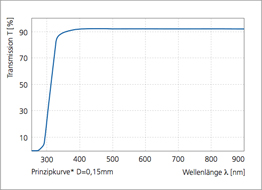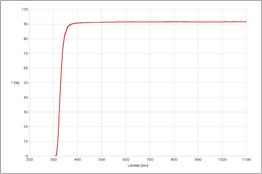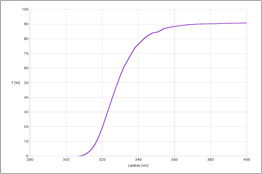D 263 T – Thin and ultra-thin glass
Special Properties
- Low microroughness (typically < 1 nm RMS)
- Excellent flatness
- Clear and practically colorless appearance
- High chemical resistance
- Can be laser-marked
- Very thin standard thicknesses down to 0.03 mm
- Colorless borosilicate glass
- Can be cut with a laser
- Flexible at low thicknesses
Typical Applications
- Cover glass
- Thin glass substrates
- Semiconductor packaging
- Optoelectronic components
- Substrates for optical coatings and filters
- CCD chip covers
- Display glass (PMLCD, AMLCD and TFT displays)
- Electroluminescence display technology
- Microsheets for microscope slides
- Optical windows
- Micro-optics technology
- Ultra-thin glass applications
- Sensor covers
- High-quality coverslips
- Thin glass wafer applications
- Thin glass and microsheet applications
Related glass types
- AF 32® eco (alkali-free alumina-borosilicate thin glass)
- MEMpax® (thin borosilicate glass)
- AS 87 eco (ultra-thin aluminosilicate glass)
- Selected float glass (soda-lime thin glass)
- AF 45 (modified borosilicate display glass)
- 0211 (alkali reduced borosilicate thin glass)
Request for Quotation
![]() 48-hour express service
48-hour express service
D 263 T is a nearly colorless flat borosilicate thin glass made by SCHOTT. The specific properties and an extensive range of standard thicknesses make D 263 T specialty glass ideal for many technical glass applications. Due to the very smooth fire-polished surfaces, D 263 T glass does not require an additional mechanical polishing treatment. D 263 T exceeds the surface quality grade, smoothness, and flatness of most commercial polishing processes. The micro-roughness of the glass surfaces is typically less than 1 nm (RMS).
Measured against optical standards that apply to thicker glass, the possible flatness of ultra-thin glass is limited for technical and physical reasons. The natural weight alone is a limiting factor for the possible flatness of ultra-thin glass. Nevertheless, even low glass thicknesses offer excellent flatness and optical surface quality that mechanically polished thin glass can hardly outperform.
SCHOTT produces D 263 T borosilicate thin glass by melting the purest raw materials. The specialty glass is resistant to chemical attack and offers a high uniform optical transmittance in the visible range. Moreover, D 263 T glass offers higher infrared transmission than most other thin glass materials (you can obtain IR transmittance curves on request).
D263T glass is a perfect choice for display technology, but it is also an ideal substrate for optics, micro-optics, and glass wafer applications. It is often the best glass material for microscope slides and thin or ultra-thin coverslips with high optical quality in research and science.
The glass is nearly always available from us in various extremely thin thicknesses with very low tolerances. Our 48–hour express-service capabilities are also available for this material.
To receive a quote for windows, substrates, or wafer components of original SCHOTT D 263 T or D 263 T eco* borosilicate glass with individual dimensions, please click the button below or select a thickness from the table.
*The D263 T eco materials have been made by SCHOTT using eco-friendly refining agents.
Specifications
Transmission at 0.15 mm thickness

Enlarge the curve (0.15 mm thickness)
Transmission at 0.7 mm thickness

Enlarge the curve (0.7 mm thickness)
UV-Transmission at 0.7 mm thickness

Enlarge the curve to view uv transmission
Standard Thicknesses
Please click on glass thickness to request a quote.| Thickness (mm) | Tolerance | |
|---|---|---|
| 0.030 | ±0.008 | — |
| 0.050 | ±0.010 | — |
| 0.100 | ±0.015 | ✔ |
| 0.145 | ±0.015 | ✔ |
| 0.175 | ±0.015 | ✔ |
| 0.210 | ±0.020 | ✔ |
| 0.300 | ±0.020 | ✔ |
| 0.400 | ±0.020 | ✔ |
| 0.550 | ±0.050 | ✔ |
| 0.550 | ±0.015 | ✔ |
| 0.700 | ±0.050 | ✔ |
| 1.100 | ±0.050 | ✔ |
| 1.100 | ±0.030 | ✔ |
| The thicknesses marked with "✔" are also available within 48–hour express service. | ||
| The thicknesses 0.070, 0.50 and 0.90 mm are sometimes available. If required, please send us a corresponding request. | ||
Optical Properties
- Abbe number: ve = 55
| Refractive index numbers | ||
|---|---|---|
| Designation
|
Wavelength (nm)
|
Refractive Index
|
ng |
436 |
1.5354 |
nF' |
480 |
1.5305 |
nF |
486 |
1.5300 |
ne |
546 |
1.5255 |
nd |
587.5 |
1.5231 |
nD |
589.3 |
1.5230 |
nC' |
644 |
1.5209 |
nC |
656 |
1.5204 |
Mechanical Properties
- Density: 2.51 g/cm3
- Young's modulus E: 72.9 kN/mm2
- Poisson's ratio μ: 0.208
- Torsion modulus G: 30.1 kN/mm2
- Knoop hardness HK100: 590
Thermal Properties
- Coefficient of mean linear thermal expansion
(static measurement): 7.2 × 10-6/K (20–300 °C)
- Viscosities:
- Working Point (104 dPa): 1051 °C
- Softening Point (107.6 dPa): 736 °C
- Annealing Point (1013 dPa): 557 °C
- Strain Point (1014.5 dPa): 529 °C
- Transformation temperature Tg: 557 °C
- Mean specific heat capacity (20–100 °C):
0.82 J/(g × K)
Chemical Capabilities
- Hydrolytic resistance according to DIN ISO 719:
- Hydrolytic Class HGB 1
- Equivalent of alkali (Na2O) per g of glass grains: 20 μg/g
- Acid resistance according to DIN 12 116:
- Acid Class S2
- Half surface weight loss after 6 h:
1.4 mg/dm2
- Alkali resistance according to DIN ISO 695:
- Alkali Class A2
- Surface weight loss after 3 h:
88 mg/dm2
Electrical Properties
| Dielectric Constant (permittivity) εr | ||||||
|---|---|---|---|---|---|---|
| Frequency in GHz | 0.001 |
1.0 |
2.0 |
5.0 |
24 |
77 |
6.7 |
6.4 |
6.4 |
6.3 |
6.3 |
6.1 |
|
| Loss Tangent tan(δ) x 10-4 | ||||||
|---|---|---|---|---|---|---|
| Frequency in GHz | 0.001 |
1.0 |
2.0 |
5.0 |
24 |
77 |
61 |
74 |
81 |
101 |
210 |
240 |
|
- Specific AC-Volume Resistivity ρD (Ω x cm):
- 1.6 × 108 (250 °C / 50 Hz)
- 3.5 × 106 (350 °C / 50 Hz)
Other materials from SCHOTT in our extensive delivery program are AF 32 eco, AS 87 eco, B 270 Superwite, BK7, and BOROFLOAT® 33. For further technical information, please feel free to contact us.
All data and specifications given are average guide values and are not guaranteed. Moreover, please consider the “Notes on Specifications”.
© 1994 – 2026 Präzisions Glas & Optik GmbH
Last update: December 17, 2025


